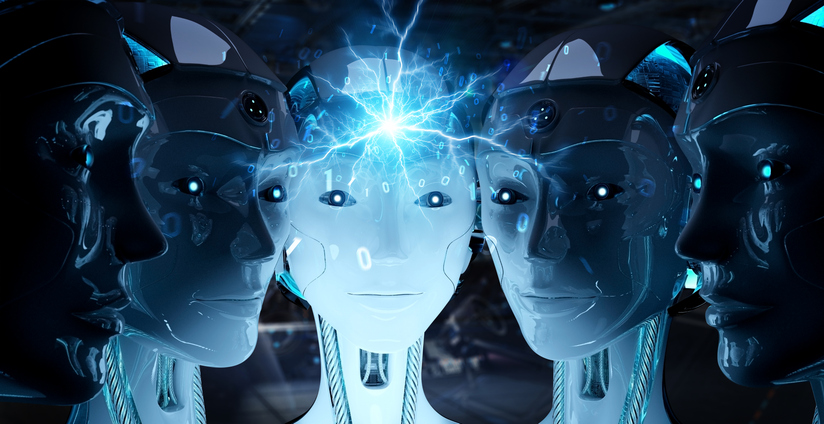A Godfather of AI Just Won a Nobel. He Has Been Warning the Machines Could Take Over the World.
Geoffrey Hinton hopes the prize will add credibility to his claims about the dangers of AI technology he pioneered
The newly minted Nobel laureate Geoffrey Hinton has a message about the artificial-intelligence systems he helped create: get more serious about safety or they could endanger humanity.
“I think we’re at a kind of bifurcation point in history where, in the next few years, we need to figure out if there’s a way to deal with that threat,” Hinton said in an interview Tuesday with a Nobel Prize official that mixed pride in his life’s work with warnings about the growing danger it poses.
The 76-year-old Hinton resigned from Google last year in part so he could talk more about the possibility that AI systems could escape human control and influence elections or power dangerous robots. Along with other experienced AI researchers, he has called on such companies as OpenAI, Meta Platforms and Alphabet -owned Google to devote more resources to the safety of the advanced systems that they are competing against each other to develop as quickly as possible.
Hinton’s Nobel win has provided a new platform for his doomsday warnings at the same time it celebrates his critical role in advancing the technologies fueling them. Hinton has argued that advanced AI systems are capable of understanding their outputs, a controversial view in research circles.
“Hopefully, it will make me more credible when I say these things really do understand what they’re saying,” he said of the prize.
Hinton’s views have pitted him against factions of the AI community that believe dwelling on doomsday scenarios needlessly slows technological progress or distracts from more immediate harms, such as discrimination against minority groups .
“I think that he’s a smart guy, but I think a lot of people have way overhyped the risk of these things, and that’s really convinced a lot of the general public that this is what we should be focusing on, not the more immediate harms of AI,” said Melanie Mitchell, a professor at the Santa Fe Institute, during a panel last year.
Hinton visited Google’s Silicon Valley headquarters Tuesday for an informal celebration, and some of the company’s top AI executives congratulated him on social media.
On Wednesday, other prominent Googlers specialising in AI were also awarded a Nobel Prize. Demis Hassabis, chief executive of Google DeepMind, and John M. Jumper, director at the AI lab, were part of a group of three scientists who won the chemistry prize for their work on predicting the shape of proteins.
Thinking like people
Hinton is sharing the Nobel Prize in physics with John Hopfield of Princeton University for their work since the 1980s on neural networks that process information in ways inspired by the human brain. That work is the basis for many of the AI technologies in use today, from ChatGPT’s humanlike conversations to Google Photos’ ability to recognise who is in every picture you take.
“Their contributions to connect fundamental concepts in physics with concepts in biology, not just AI—these concepts are still with us today,” said Yoshua Bengio , an AI researcher at the University of Montreal.
In 2012, Hinton worked with two of his University of Toronto graduate students, Alex Krizhevsky and Ilya Sutskever, on a neural network called AlexNet programmed to recognise images in photos. Until that point, computer algorithms had often been unable to tell that a picture of a dog was really a dog and not a cat or a car.
AlexNet’s blowout victory at a 2012 contest for image-recognition technology was a pivotal moment in the development of the modern AI boom, as it proved the power of neural nets over other approaches.
That same year, Hinton started a company with Krizhevsky and Sutskever that turned out to be short-lived. Google acquired it in 2013 in an auction against competitors including Baidu and Microsoft, paying $44 million essentially to hire the three men, according to the book “Genius Makers.” Hinton began splitting time between the University of Toronto and Google, where he continued research on neural networks.
Hinton is widely revered as a mentor for the current generation of top AI researchers including Sutskever, who co-founded OpenAI before leaving this spring to start a company called Safe Superintelligence.
Hinton received the 2018 Turing Award, a computer-science prize, for his work on neural networks alongside Bengio and a fellow AI researcher, Yann LeCun . The three are often referred to as the modern “godfathers of AI.”
Warnings of disaster
By 2023, Hinton had become alarmed about the consequences of building more powerful artificial intelligence. He began talking about the possibility that AI systems could escape the control of their creators and cause catastrophic harm to humanity. In doing so, he aligned himself with a vocal movement of people concerned about the existential risks of the technology.
“We’re in a situation that most people can’t even conceive of, which is that these digital intelligences are going to be a lot smarter than us, and if they want to get stuff done, they’re going to want to take control,” Hinton said in an interview last year.
Hinton announced he was leaving Google in spring 2023, saying he wanted to be able to freely discuss the dangers of AI without worrying about consequences for the company. Google had acted “very responsibly,” he said in an X post.
In the subsequent months, Hinton has spent much of his time speaking to policymakers and tech executives, including Elon Musk , about AI risks.
Hinton cosigned a paper last year saying companies doing AI work should allocate at least one-third of their research and development resources to ensuring the safety and ethical use of their systems.
“One thing governments can do is force the big companies to spend a lot more of their resources on safety research, so that for example companies like OpenAI can’t just put safety research on the back burner,” Hinton said in the Nobel interview.
An OpenAI spokeswoman said the company is proud of its safety work.
With Bengio and other researchers, Hinton supported an artificial-intelligence safety bill passed by the California Legislature this summer that would have required developers of large AI systems to take a number of steps to ensure they can’t cause catastrophic damage. Gov. Gavin Newsom recently vetoed the bill , which was opposed by most big tech companies including Google.
Hinton’s increased activism has put him in opposition to other respected researchers who believe his warnings are fantastical because AI is far from having the capability to cause serious harm.
“Their complete lack of understanding of the physical world and lack of planning abilities put them way below cat-level intelligence, never mind human-level,” LeCun wrote in a response to Hinton on X last year.
 Copyright 2020, Dow Jones & Company, Inc. All Rights Reserved Worldwide. LEARN MORE
Copyright 2020, Dow Jones & Company, Inc. All Rights Reserved Worldwide. LEARN MORE
Margot Robbie and Jacob Elordi star in an adaptation of the classic novel that respects the romance’s slow burn.
High-end homeowners are choosing to upgrade rather than relocate, investing in bespoke design, premium finishes and long-term lifestyle value.
The social-media company’s revenue increased 14%, falling short of estimates.
Pinterest shares tumbled after the company projected that revenue growth would slow in the first quarter, amid an advertiser pullback that weighed on its fourth-quarter earnings.
Shares slid 18.5% to $15.10 in after-hours trading after closing the market session down 2.9% at $18.54.
Pinterest reported a 14% increase in fourth-quarter revenue to $1.32 billion, up from $1.15 billion a year earlier, but short of analysts’ estimate of $1.33 billion, according to FactSet. The company posted 17% revenue growth in the third quarter.
The company expects growth to decelerate further in the current first quarter, projecting growth between 11% and 14%. It’s forecasting revenue between $951 million and $971 million.
Chief Executive Officer William Ready said the company needs to broaden its revenue mix and accelerate sales going forward.
“We are not satisfied with our Q4 revenue performance and believe it does not reflect what Pinterest can deliver over time,” he told analysts on a call Thursday. “We are moving with urgency to return over time to the mid-to-high-teens growth, or better than what we have been consistently delivering.”
Pinterest on Thursday recorded a profit of $277.1 million, or 41 cents a share, compared with its profit of $1.85 billion, or $2.68 a share, a year earlier. The $1.85 billion profit in 2024 included a $1.6 billion benefit from deferred tax assets.
Stripping out certain one-time items, Pinterest logged adjusted earnings of 67 cents a share, in line with analyst expectations, according to FactSet.
Ready said the company continues to see headwinds from larger retailers pulling back on advertising spending to protect their margins amid the impact from President Trump’s tariffs.
“We saw continued softness from this cohort of large retailers,” Ready said. “While we see opportunity over the long term, the near-term outlook for this cohort on our platform remains pressured given these headwinds.”
Ready said the company has expanded its footprint among mid-market and small-to-medium business advertisers, as well as international businesses. Still, he said Pinterest had a ways to go to offset the headwinds from larger advertisers, which may become even more pronounced in the current quarter.
Chief Financial Officer Julia Donnelly added that the company is looking to increase its investments in sales and research and development related to artificial-intelligence following the launch of its restructuring effort in January. Pinterest said last month that it would cut about 15% of its workforce, or approximately 700 jobs.
The era of the gorgeous golden retriever is over. Today’s most coveted pooches have frightful faces bred to tug at our hearts.
Paine Schwartz joins BERO as a new investor as the year-old company seeks to triple sales.
























